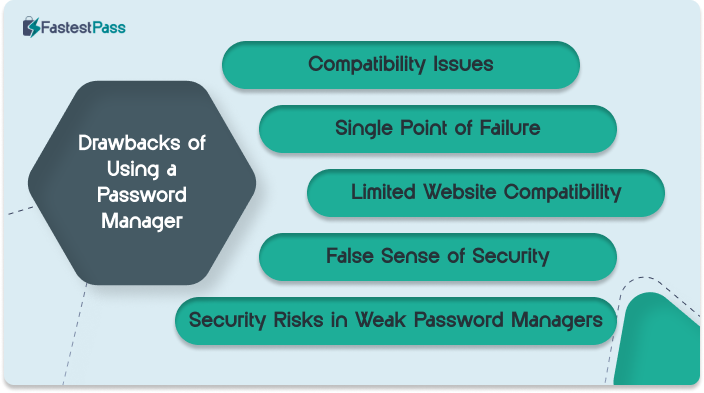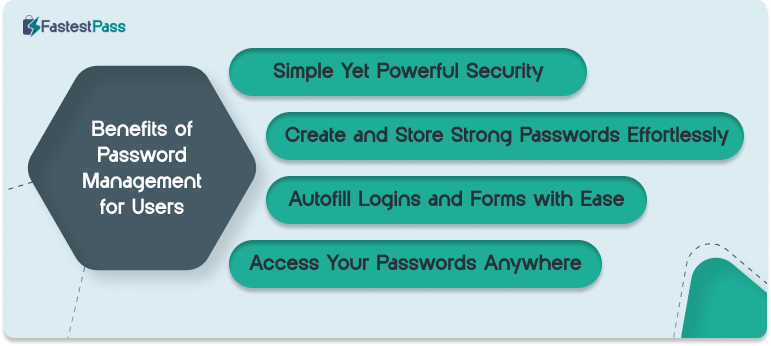
It is challenging enough to keep track of your complex passwords. These days, everything requires a login. Some users rely on simple passwords, while others use complex passwords for their account’s protection. However, neither of these options is secure since hackers are becoming more sophisticated with each passing day. They can easily steal your credentials. Hence, a good option is using a password manager. But what is a password manager, and what can you do with it? Let’s figure it out below.
What Is a Password Manager?
A password manager is software that helps users generate, store, and manage online passwords. It uses encryption to hide your passwords. Moreover, it gives you a master password to access other secure credentials. Creating strong and unique passwords for each account ensures online security and minimizes risks.
What Would a Password Manager Allow You to Do?
A password manager helps you:
- Store Passwords Safely – Keeps all your passwords locked in an encrypted vault.
- Generate Strong Passwords – Creates unique, complex passwords for every account.
- Autofill Login Details – Instantly enter your credentials on websites and apps.
- Sync Across Devices – Gives you secure access to passwords on all your devices.
- Share Passwords Securely – This lets you share login details without exposing them.
- Detect Weak or Compromised Passwords – Warns you about weak, reused, or breached passwords.
- Support Two-Factor Authentication (2FA) – Stores and autofills 2FA codes for extra security.
- Store Sensitive Information – Keeps notes, payment details, and personal data secure.
Drawbacks of Using a Password Manager
While password managers boost security, they do have some downsides. Though they’re a great tool in today’s cyber threat landscape, a few concerns exist.
1. Compatibility Issues
The most common issue with a password manager is compatibility. Not all password managers are compatible with every device. Some only sport-specific systems. However, you can solve this problem by simply using a password manager that supports your system.
2. Single Point of Failure
A single point of failure is also considered a disadvantage of a password manager. It means that you can only access your password manager with a single master password. If you lose it, you will lose access to everything, including all your account passwords. Moreover, if this master password gets hacked, all your data will be easily stolen.
3. Limited Website Compatibility
Some password managers cannot work smoothly on all websites. They might fail to recognize login fields and force you to enter credentials manually. Hence, it is crucial to choose a trusted password manager with vast compatibility.
4. False Sense of Security
Sometimes, relying too much on a password manager makes you careless. It means that you get too comfortable with it and pay less attention to cybersecurity habits. It is a wrong approach. In fact, you should use a password manager with other cybersecurity measures to ensure maximum protection.
5. Security Risks in Weak Password Managers
All password managers are secure; it is a myth. If a tool lacks strong encryption, it can be an easy target for hackers. Only the best password managers are those that use AES 256-bit encryption to keep your credentials safe from unauthorized access.
Benefits of Password Management for Users
1. Simple Yet Powerful Security
Cybersecurity experts highly recommend using password managers. This is because they make password security simple and easy. They also help you in generating and managing strong passwords without any hassle. Password managers also reduce risk and keep things simple.
2. Create and Store Strong Passwords Effortlessly
It is impossible to keep track of complex passwords for multiple accounts. People often write credentials on paper instead of using a password manager. This approach is not safe. A password manager is much more secure and safely saves your password in a vault.
3. Autofill Logins and Forms with Ease
A password manager makes the entire login process hassle-free. It saves you time by auto-filling your credentials. Web browsers’ built-in password storage is easy to hack. A dedicated password manager offers much stronger security. For better protection, turn off your browser’s password-saving feature.
4. Access Your Passwords Anywhere
The best password managers work across multiple devices. Allow you to access your credentials when needed. Choosing one with broad compatibility ensures a secure and smooth login experience on all your devices.
Choosing the Right Password Manager
Before finding the benefits of password managers, it is important to know that not all tools are created equal. Some downsides only apply to specific password managers, especially those lacking strong encryption. Choosing a secure, well-supported password manager can help you avoid many of these possible problems.
Conclusion
A password manager simplifies and strengthens online security by securely storing, generating, and auto-filling complex passwords. It reduces the risk of breaches, saves time, and ensures you never have to remember multiple passwords again. Choosing a reliable password manager can enhance your digital security and streamline account access across all your devices.
Secure and Create Stronger Passwords Now!
Generate passkeys, store them in vaults, and safeguard sensitive data!
Subscribe to Our Newsletter
Receive the latest updates, trending posts, new package deals,and more from FastestPass via our email newsletter.
By subscribing to FastestPass, you agree to receive the latest cybersecurity news, tips, product updates, and admin resources. You also agree to FastestPass' Privacy Policy.









